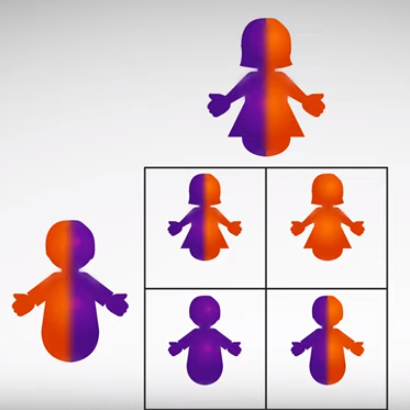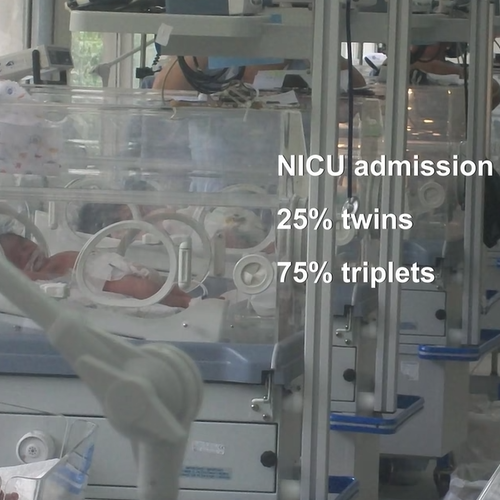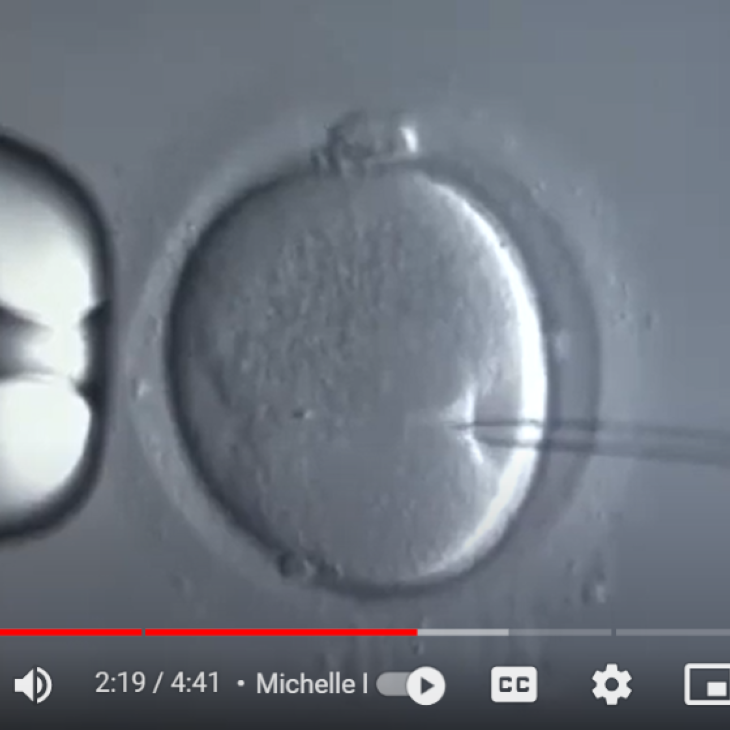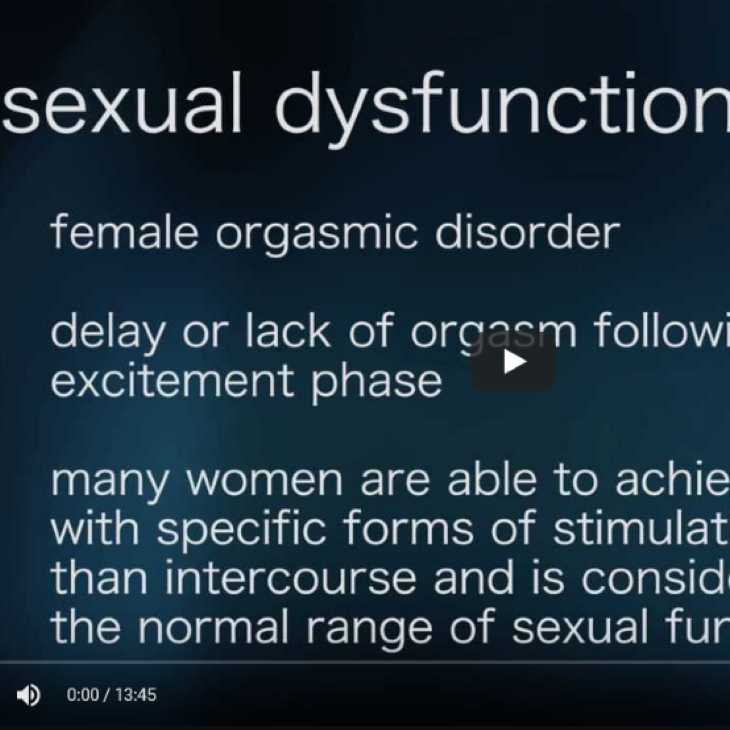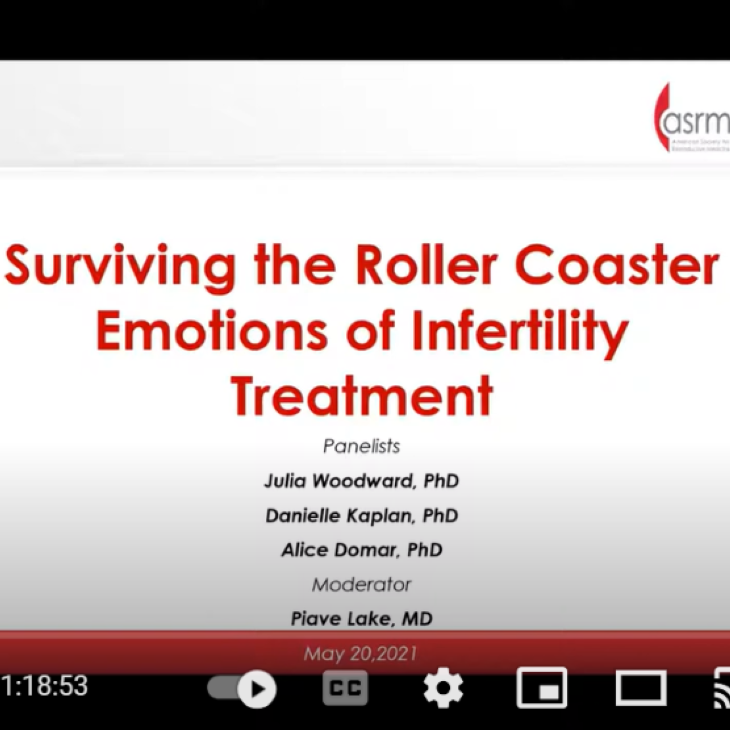Causes of Male Infertility
Transcript
Dr. Roger Lobo, of the American Society for Reproductive Medicine explains the causes of male infertility.
Hi I'm Dr. Roger Lobo with the American Society for Reproductive Medicine.
Today, we're talking about the causes of male infertility. Male infertility can be due to a variety of conditions. Some of these can be found and corrected while others cannot be corrected.
Most problems with male infertility occur when there are low numbers of sperm or abnormalities in their movement or shape. This can result from abnormalities in the production, transport, or delivery of sperm.
A varicocele is a common potentially correctable cause of male infertility. A varicocele is a collection of enlarged veins in the scrotum that can affect sperm production and its characteristics. Varicocele occurs in about 15% of all men and as many as 40% of those who are infertile. The tricky thing with that area is there are a lot of fertile men who are found with varicocele, so what do you do when you find a small one in an infertile male? This is when a male might first want to consult with a urologist before acting on taking care of a varicocele which sometimes might require surgery.
About 10 to 15% of men with low sperm counts have an abnormality in the Y chromosome which affects the development of sperm. Others may be born without critical parts of the sperm transport process, such as the vas deferens, which connect the testes to the male urethra.
Vasectomy is a common surgical cause of male infertility in men who have changed their minds about fertilization. But men who have had other surgery in or near the reproductive tract also can have problems. Injury to the nerve supply and/or obstructions in a transport system can affect sperm production.
For some men, fertility is affected by abnormal hormones, too. Too much estrogen and/or too little testosterone can negatively affect the development and maturation of sperm. Other hormones may be involved as well.
Temperature also plays a critical role. Sperm can only mature at temperatures lower than the core body temperature. This is why the testes normally lie in the scrotal sacs outside of the body. Heat exposure or conditions where the testes have not descended into the scrotum can affect sperm production.
Male infertility can also be due to infections, certain medical conditions, and exposure to toxins such as chemotherapy or radiation.
To learn more, check out our other videos on fertility, including the Basic Infertility Evaluation.
Videos
Resources For You
Infertility
SART Fertility Experts - Military Families and Fertility
Active-duty individuals in the military sometimes face unique circumstances when seeking fertility care. Learn more with a former military fertility physician. Listen to the EpisodeSART Fertility Experts - Q&A on Infertility
Infertility can create many questions for a patient. Listen to common questions and answers about infertility, egg freezing, and genetic testing. Listen to the EpisodeFertility Care Gets Important Win in California
ASRM celebrates California's SB 729, expanding IVF coverage for same-sex couples and singles, advancing equitable fertility care access.
View the Press ReleaseNational Infertility Awareness Week
April 20-26, 2025, is National Infertility Awareness Week (NIAW)!
View the NIAW ToolkitASRM announces support for HOPE with Fertility Services Act
The American Society for Reproductive Medicine is proud to endorse the HOPE with Fertility Services Act (HR 8821).
View the Press ReleaseSART Fertility Experts - Environmental Impacts on Fertility
In this episode, the fertility experts discuss the impact of the environment, including air, climate, and chemical exposures on infertility. Listen to the EpisodeSurvey shows strong support for increased access to fertility treatments
A new public opinion poll reveals strong support for improved access to In Vitro Fertilization (IVF).
View the Press ReleaseSART Fertility Experts - Recurrent Pregnancy Loss and Implantation Failure
"I can get pregnant, but I can't stay pregnant," is echoed by patients with recurrent pregnancy loss. Listen to the EpisodeSART Fertility Experts - Wellness and Fertility: Diet, Sleep and Exercise
Drs. Timothy Hickman and Rashmi Kudesia discuss the links between lifestyle and fertility. Listen to the EpisodeSART Fertility Experts - Navigating IVF as a Couple
Mary Casey Jacob, PhD is interviewed by Dr. Daniel Grow, and together they explore the emotional and practical support that couples need. Listen to the EpisodeMale Fertility Journey
About 20% of infertility cases are due to a male factor alone. Another 30% involves both male and female factors.
View the Patient JourneyFemale Fertility Journey
If you've been trying to get pregnant for more than a year, you may have infertility. Infertility is a disease of the reproductive system that impairs one of the body's most basic functions: the conception of children.
View the Patient JourneyStress and infertility
It is not clear how exactly stress impacts fertility. Read the Fact SheetHyperprolactinemia (High Prolactin Levels)
Prolactin is a hormone produced by your pituitary gland which sits at the bottom of the brain. Read the fact sheetOptimizing Natural Fertility
Before attempting pregnancy, a woman should make sure she is healthy enough for pregnancy by adopting a healthier lifestyle and taking prenatal vitamins. If she has a medical or genetic condition or risk of one, she should seek advice from a medical professional before conceiving (becoming pregnant) View the fact sheetOptimizing Male Fertility
About 20% of infertility cases are due to a male factor alone. Another 30% involves both male and female factors. View the fact sheetDefining Infertility
Infertility is “the inability to conceive after 12 months of unprotected intercourse.” View the Fact SheetFertility Rights and Responsibilities
Can a fertility program or clinic deny treatment to patient(s) if there is concern about the ability to care for the child(ren)? Yes. Fertility programs can withhold services if there are signs that patients will not be able to care for child(ren). View this Fact SheetMale Fertility Evaluation: What do I need to know?
Infertility is the inability to achieve pregnancy after one year of unprotected sex. View the fact sheetSmoking and infertility
Most people understand that smoking increases the risk for heart, vascular, and lung disease. View the fact sheetWhat are fibroids?
Uterine fibroids (also called myomas or leiomyomas) are benign (noncancerous) tumors of muscle tissue found in the uterus. View the fact sheetInfertility Counseling and Support: When and Where to Find It
Infertility is a medical condition that touches all aspects of your life. View the fact sheetWhat is In Vitro Maturation (IVM)?
In vitro maturation (IVM) is when a woman’s eggs are collected and matured outside the body. This is done as part of an in vitro fertilization (IVF) procedure. View the fact sheetSART Fertility Experts - Endometriosis
Endometriosis is a condition that can affect many facets of a person’s life, from pelvic pain to struggles with infertility. Listen to the EpisodeSART Fertility Experts - Recurrent Pregnancy Loss
Candace discusses her experience with infertility, IVF, multiple pregnancy losses and ultimately a successful delivery with Dr. Julia Woodward.Listen to the Episode
SART Fertility Experts - Financial Aspects of Infertility Treatment
“I know what treatment I want and need to do, but how can I afford it?” This is a common question infertility patients often ask themselves. Listen to the EpisodeSART Fertility Experts - Infertility Advocacy and Government Affairs
In today's episode, Dr. Mark Trolice interviews Sean Tipton about the fact that many infertility patients do not have insurance coverage for treatment. Listen to the EpisodeSART Fertility Experts - Your Infertility Nurse: Partner in Your Care
Infertility nurse practitioner and health coach Monica Moore explains the essential role of the infertility nurse in the IVF process. Listen to the EpisodeIntracytoplasmic sperm injection (ICSI)
A procedure called intracytoplasmic sperm injection (ICSI) can be done along with in vitro fertilization (IVF) if a sperm cannot penetrate the outer layer of an egg. Read the Fact SheetSART Fertility Experts - IVF: Cycles of Hope and Heartbreak
Does stress cause infertility or is it the other way round? Listen to the EpisodeSART Fertility Experts - RESOLVE and Infertility
Due to the unique stress of infertility, patients often look for resources and support in addition to those provided by their medical provider. Listen to the EpisodeWhat is Recurrent Pregnancy Loss (RPL)?
This is a condition when a woman has 2 or more clinical pregnancy losses (miscarriages) before the pregnancies reach 20 weeks. View the fact sheetWhat is Premature Ovarian Insufficiency (Previously Called Premature Ovarian Failure)?
When a woman’s ovaries stop working before age 40, she is said to have premature ovarian insufficiency (POI). View the fact sheetTestosterone use and male infertility
Testosterone (also referred to as “T”) is a hormone produced in men by the testes (testicles). View the fact sheetSART Fertility Experts - Safe Surfing: The Pros and Perils of Social Media
Dr. Kenan Omurtag, MD joins host Dr. Mark Trolice to discuss the use of social media in the field of infertility. Listen to the EpisodeSART Fertility Experts - What is an REI?
These experts in infertility lead IVF programs, perform reproductive surgery, and perform research to enhance the field of reproductive medicine. Listen to the EpisodeStress and Infertility
Medical procedures, cost, outcome uncertainty, and unwanted or unhelpful advice from friends and family are stressors associated with infertility treatment. Watch VideoInfertility: an Overview (booklet)
Infertility is typically defined as the inability to achieve pregnancy after one year of unprotected intercourse. View the bookletMale Fertility and Infertility - a patient education video
Male Factor Infertility is responsible for about 30% of infertility cases and can contribute infertility to an additional 20% of cases. Watch VideoInfertility
Infertility is the result of a disease (an interruption, cessation, or disorder of body functions, systems, or organs) of the male or female reproductive tract which prevents the conception of a child or the ability to carry a pregnancy to delivery. Watch VideoBasic Infertility Evaluation
Dr. Roger Lobo of the American Society for Reproductive Medicine discusses the various methods to evaluate infertility. Watch VideoFibroid Tumors
An educational video that answers patient questions about the causes, symptoms, diagnosis and management of uterine fibroids. Watch VideoInfertility Treatments
Dr. Roger Lobo of the American Society for Reproductive Medicine discusses the various treatments for infertility. Watch VideoUnderstanding Fertility
In this video series, Dr. Roger Lobo explains the basics of infertility, including causes, treatments and coping methods. Watch VideoSurviving the Roller Coaster Emotions of Infertility Treatment
The experience of infertility is a rollercoaster of hope and disappointment. Treatment presents an opportunity for hope as well as a new set of challenges. Watch VideoAcupuncture and Infertility Treatment
Acupuncture is an alternative medical treatment that involves placing very thin needles at different points on the body. View the Fact SheetSexual dysfunction and infertility
Sexual dysfunction is a problem in a person’s sexual desire, arousal, or orgasm. View the fact sheetCoping With Infertility
Dr. Roger Lobo of the American Society for Reproductive Medicine discusses various methods of coping with infertility. Watch VideoEndometriosis
Endometriosis is a condition in which endometrial tissue, which normally lines the uterus, develops outside of the uterine cavity in abnormal locations. Watch VideoCauses of Female Infertility
Dr. Roger Lobo, of the American Society for Reproductive Medicine explains the causes of female infertility. Watch VideoAge and Fertility (booklet)
Generally, reproductive potential decreases as women get older, and fertility can be expected to end 5 to 10 years before menopause. View the BookletCauses of Male Infertility
Dr. Roger Lobo, of the American Society for Reproductive Medicine explains the causes of male infertility. Watch VideoFAQ About Infertility
Infertility is not an inconvenience; it's a disease of the reproductive system that impairs the body's ability to perform the basic function of reproduction. Learn the factsFAQ About the Psychological Component of Infertility
Infertility often creates one of the most distressing life crises that a couple has ever experienced together. Learn the factsMary Dolan's Story
Infertility Infographics
ASRM has prepared infographics to illustrate the subject of Infertility better. View the infographicsMale Fertility/Andrology
AUA Releases Male Infertility Guideline Amendment
The AUA, in collaboration with the American Society for Reproductive Medicine (ASRM), has released the 2024 amendment to the Male Infertility Guideline.
View the Press ReleaseSART Fertility Experts - Wellness and Fertility: Diet, Sleep and Exercise
Drs. Timothy Hickman and Rashmi Kudesia discuss the links between lifestyle and fertility. Listen to the EpisodeMale Fertility Journey
About 20% of infertility cases are due to a male factor alone. Another 30% involves both male and female factors.
View the Patient JourneySART Fertility Experts - Urology and Male Reproductive Health
Stress and infertility
It is not clear how exactly stress impacts fertility. Read the Fact SheetOptimizing Natural Fertility
Before attempting pregnancy, a woman should make sure she is healthy enough for pregnancy by adopting a healthier lifestyle and taking prenatal vitamins. If she has a medical or genetic condition or risk of one, she should seek advice from a medical professional before conceiving (becoming pregnant) View the fact sheetOptimizing Male Fertility
About 20% of infertility cases are due to a male factor alone. Another 30% involves both male and female factors. View the fact sheetCancer and its impact on sperm, cryopreservation, and fertility
This can be confusing since the terms are often used interchangeably in the media and casual conversation. View the fact sheetMale Fertility Evaluation: What do I need to know?
Infertility is the inability to achieve pregnancy after one year of unprotected sex. View the fact sheetSperm morphology (shape): Does it affect fertility?
The most common test of a man’s fertility is a semen analysis. View the fact sheetFertility Options for Men with Spinal Cord Injury
There are several reasons a man with a spinal cord injury (SCI) might have infertility. View the fact sheetVaricocele
A varicocele is a variation of normal anatomy in which veins in the scrotum (the sac that holds the testicles) become enlarged and sometimes even visible. View the fact sheetWeight and fertility
One of the easiest ways to determine if you are underweight or overweight is to calculate your body mass index (BMI). View the fact sheetSART Fertility Experts - Male Factor
Intracytoplasmic sperm injection (ICSI)
A procedure called intracytoplasmic sperm injection (ICSI) can be done along with in vitro fertilization (IVF) if a sperm cannot penetrate the outer layer of an egg. Read the Fact SheetSART Fertility Experts - IVF: Cycles of Hope and Heartbreak
Does stress cause infertility or is it the other way round? Listen to the EpisodeTestosterone use and male infertility
Testosterone (also referred to as “T”) is a hormone produced in men by the testes (testicles). View the fact sheetSART Fertility Experts - Male Fertility
Did you know that up to 40% of infertile couples suffer from male factor infertility? Listen to the EpisodeInfertility: an Overview (booklet)
Infertility is typically defined as the inability to achieve pregnancy after one year of unprotected intercourse. View the bookletMale Fertility and Infertility - a patient education video
Male Factor Infertility is responsible for about 30% of infertility cases and can contribute infertility to an additional 20% of cases. Watch VideoInfertility
Infertility is the result of a disease (an interruption, cessation, or disorder of body functions, systems, or organs) of the male or female reproductive tract which prevents the conception of a child or the ability to carry a pregnancy to delivery. Watch VideoBasic Infertility Evaluation
Dr. Roger Lobo of the American Society for Reproductive Medicine discusses the various methods to evaluate infertility. Watch VideoInfertility Treatments
Dr. Roger Lobo of the American Society for Reproductive Medicine discusses the various treatments for infertility. Watch VideoUnderstanding Fertility
In this video series, Dr. Roger Lobo explains the basics of infertility, including causes, treatments and coping methods. Watch VideoSurviving the Roller Coaster Emotions of Infertility Treatment
The experience of infertility is a rollercoaster of hope and disappointment. Treatment presents an opportunity for hope as well as a new set of challenges. Watch VideoCauses of Male Infertility
Dr. Roger Lobo, of the American Society for Reproductive Medicine explains the causes of male infertility. Watch VideoFAQ About Infertility
Infertility is not an inconvenience; it's a disease of the reproductive system that impairs the body's ability to perform the basic function of reproduction. Learn the factsMale Fertility Infographics
ASRM has prepared infographics to illustrate the subject of Male Fertility better. View the infographicsFind a Health Professional





